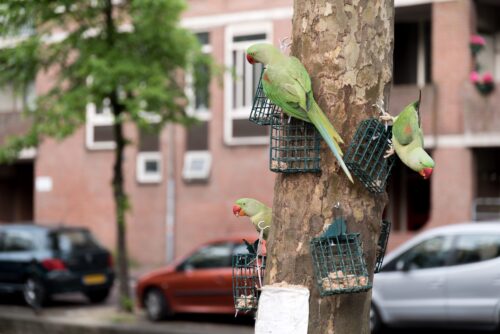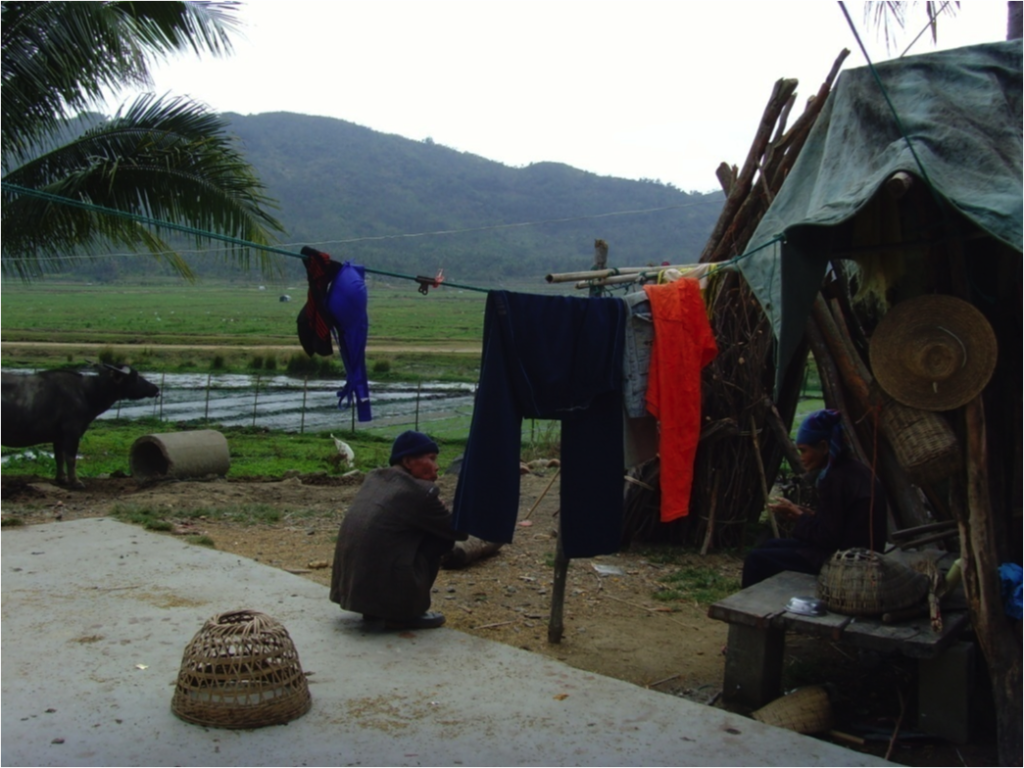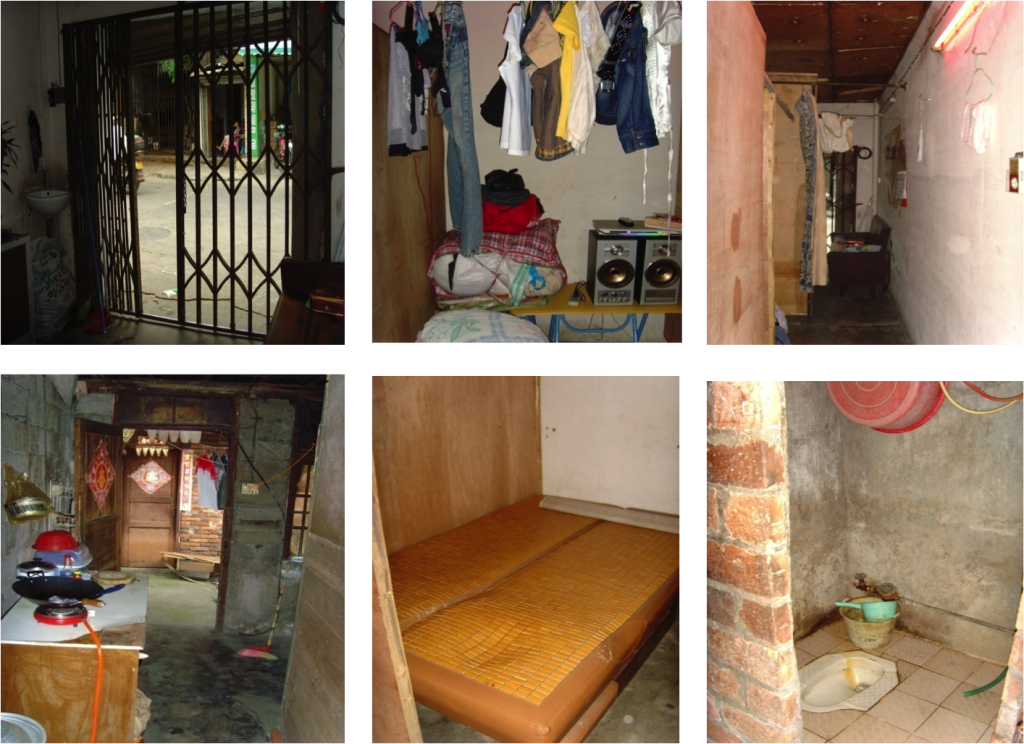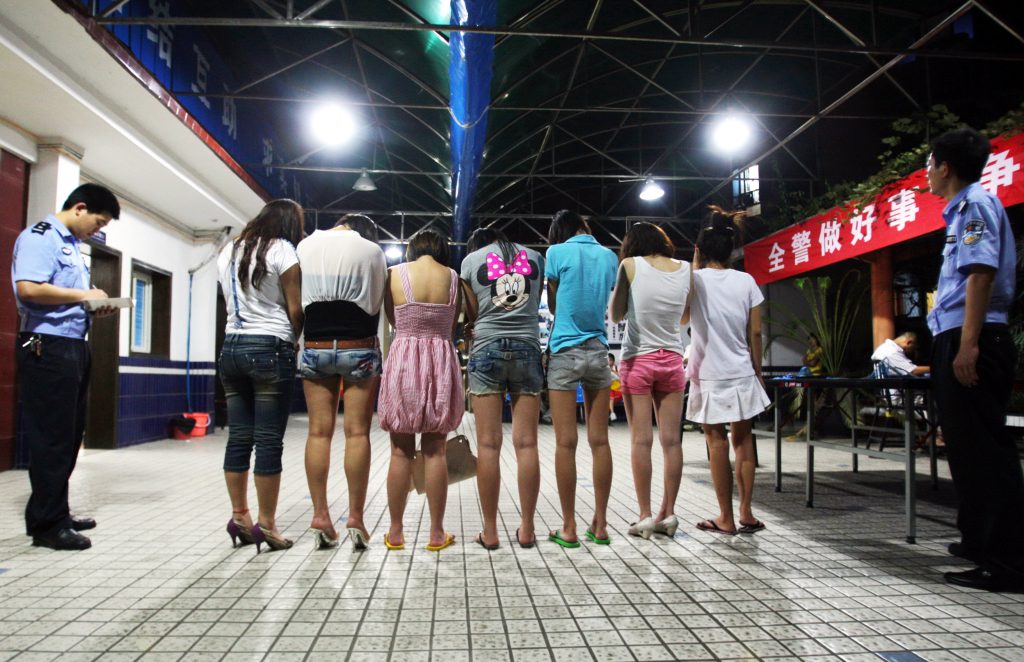The Moral Code of Chinese Sex Workers
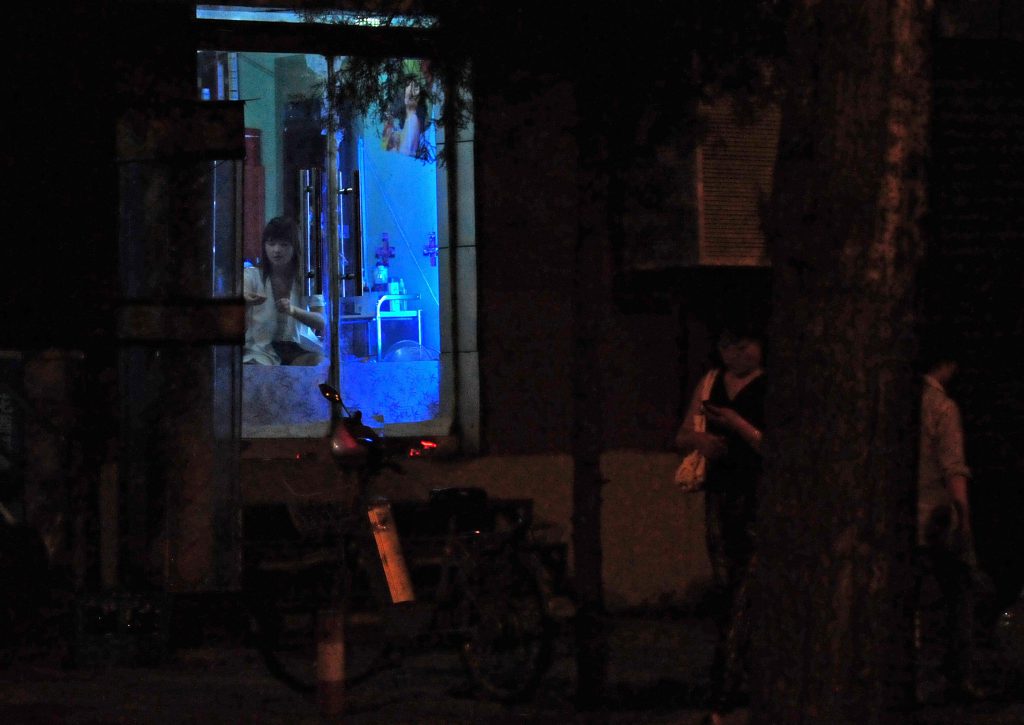
One hot afternoon in July 2008, I was sitting with Li, a 27-year-old female sex worker, in her tiny room in the red-light district of Haikou, the capital of China’s Hainan province. [1] [1] All names in this piece, except for the author’s, are pseudonyms. The concrete walls were covered with colorful posters of Chinese pop stars and erotic images of white couples. As Li and I were chatting about her life, Zhang burst in, panicked, saying she had to hide from her “sister” Hong. Hong entered a few minutes later and began furiously beating Zhang until she collapsed onto the floor. Their madam followed a minute later and shouted, “Hit her mouth! Hit her mouth!” I frantically asked what was happening. No one paid me any attention. Li sat quietly and said nothing.
This moment of violence in a seemingly friendly community of “sisters” shocked me. As a researcher conducting ethnographic fieldwork, I was six months into my journey interviewing women throughout the red-light districts in and around Haikou. I was there to study female sex workers (xiaojie, or “misses” or “young ladies”) for my doctoral program at Stanford University. Though I was in my 30s, I had led a fairly sheltered existence up to that point, and I was still naïve about the lives of female sex workers. While Hong’s attack on Zhang didn’t make me worried for my personal safety, I did find it confusing—and deeply disturbing. What was going on?
Although many people assume that female sex workers live a life of impropriety or immorality, I came to realize over the course of my research with Chinese sex workers that they had their own strict moral code. Working in an illegal and risky business, they constructed a set of rules of conduct to keep themselves safe and successful. Breaking that code sometimes led to beatings like Zhang’s. But the social rules also encouraged women to forge networks of trust—networks that ultimately included me and my work.
Since economic reforms were put in place in the late 1970s, China has seen a dramatic boom in its market economy and an influx of rural migrants into urban areas that could well be the largest labor flow in human history. The rural-urban inequalities that have emerged over the last several decades have caused approximately 120 to 250 million peasants to move from China’s countryside to its cities in search of work, and a large number of migrant women have become sex workers. An estimated 4 to 10 million women are now working in China’s sex trade, and many experts say that the majority of these women are poor migrants. Sex work is technically illegal in China, but the sex industry is booming.
I was born and raised in Korea, a country where gender inequality is particularly pronounced, and my own gender-biased upbringing prompted my interest in women’s studies. When I paired this interest with my career as an anthropologist, I grew curious about the daily lives of women in China’s sex trade. Prior studies were largely about women’s sexual partnerships, focusing on things like the flow of sexually transmitted infections (STIs). But I wanted to know more about their social relationships: Were they isolated and marginalized? What did their social networks look like? Why did they do what they did?
Toward the end of 2006, I began my 26-month journey to answer these questions. I tried to work for three months in Shanghai and another three in Beijing, but officials in both cities were suspicious of the motives of a foreign researcher. Also, the spotlight of the Beijing 2008 Summer Olympics made it hard for me to do my work (even in Shanghai, since it is the other “face” of China). Eventually, a journalist who reported on female sex workers took me to Hainan Island, a popular tourist destination called the “Hawaii of China” for its beautiful scenery, and I decided to do my main ethnographic fieldwork there.
From the beginning, the work was a culture shock for me. Early on, before I met any of the main participants in my research, two informants—a journalist and a public health worker—told me that they were worried about my lack of knowledge and experience. They taught me some of the blunt slang of the community, like “to masturbate” (da feiji) and “to have sex” (da pao), so I could try to fit in.
But as it turned out, my inexperience actually became an advantage. The sex workers I was working with found my naïveté interesting, and it drew their sympathies; it made them want to help me, to take me under their wing as it were, and thus allowed me better access and more time to become adept at socializing with them. In total, I spoke with more than 400 sex workers from diverse backgrounds and closely interacted with about 40 women. I came to form particularly close bonds with several women who lived in an apartment complex in Haikou.
Each of these women had several regular clients and up to 10 temporary clients on a working day, depending on the season and their “luck.” Some had well-off “sugar daddy” types of clients (laotou, or “old fellows”) who would pay them a monthly stipend and give them various gifts as well as money toward rent. The women also often had boyfriends who they spent time with for love rather than money; some were married (and, in many cases, separated) or divorced. On average, they worked about 20 days a month and spent a lot of time socializing, traveling, and visiting each other’s homes. Some went back to their home village seasonally to help with farming.
The majority of my study participants were from low socioeconomic backgrounds, and they ranged from elementary school dropouts to junior high school graduates. Despite their limited education, the women made a substantial amount of money—on average, they earned about two to three times more than what a new college graduate might make in the region. In this way, sex work in China is not “survival sex.” But they also lived with a never-ending risk of illness, pregnancy, and arrest. When forced to stop working—for example, if they needed an abortion or because of STIs—they at times resorted to living in their workplace, such as a brothel (often referred to as a falang, or “hair salon”) with only thin partitions between workspaces.
Despite the clear differences between us, my study participants fully embraced me as their “sister” (jiemei), taught me about their local world, and shared their daily feelings and thoughts. They found it unimaginable that I had always been a student, without any significant work experience, and that I was so ignorant about what they called “society” (shehui). Because I was so lacking, I was ranked lower in the hierarchy of “sisters,” just above the sex workers who were younger than 25 years old. Many women in their 30s were at the level of madams or experienced sex workers, so they were called “elder sister” (jie); I had to express my respect for their experiences by calling them “elder,” despite the fact that some of them were younger than me. My lack of experience and knowledge put the women at ease. They laughed at my goofy questions—such as when I asked if they loved their regular clients (they considered what they did as simply a job that had nothing to do with romantic feelings) or if their “official stories” for clients and outsiders were real—and they were keen to educate me.
They also offered me some unsolicited but well-intentioned life coaching. They thought my husband, who was living in the U.S., must be having affairs, since we were living separately for such a long time. Since continuously searching for a new woman is in a man’s “nature” and all men are “like that,” the women I bonded with claimed I should wisely address the situation by securing my finances and enhancing my sexual appeal, meaning take care of my figure and dress more suggestively. To that end, they presented me with various colorful and erotic (but very uncomfortable) underwear.
These women, who had largely migrated from poor rural areas, regarded sex work as their best option given their circumstances. That said, they did not think it was a good job. They sometimes delicately inquired as to whether my financial situation was stable, offering to introduce me to a brothel or to their nice regulars if I needed some quick, substantial money. When I assured them I was not in need, thanks to my research funding, they all discouraged me from doing sex work.
The women often started, and continued, this work as a way to fulfill their moral obligation to support their families. Traditionally, Chinese daughters are often expected to make significant contributions to the household economy before marriage—much more so if their family is in need. The majority of female sex workers I met during my fieldwork were constantly pressured by their family members to provide continuous, significant financial support. These women frequently sent enough money home that loved ones could build a new house, buy material goods—such as a motorbike, furniture, or cellphones—meet their living costs, and put money toward their education. Married women did the same for their families and children left behind at home.
Sometimes when I was observing my research participants in “hair salons” or “massage parlors,” clients picked me for their attentions, and my “sisters” would tell them that I was “not doing massage” (bu an) and that they had to pick someone else. My appearance was very plain (jeans, black plastic glasses, a T-shirt, a pair of sneakers, and a backpack), which was a deliberate strategy on my part to signal that I was not a sex worker. Thinking it strange that some men would pick me, I asked my “sisters” about it, and one of them explained, “An apple has one taste, a banana has the other taste, and a pineapple has another taste. Many people like apples and bananas. Say you like apples and bananas—but you can’t just keep eating apples and bananas everyday! You need to change your taste once in a while. Let’s say you’re the pineapple.”
Another time, when I was traveling with some of the women as they visited their “sisters” in rural brothels, an owner and pimp from a neighboring “massage parlor” mistook me for a sex worker (because I was with sex workers) and followed me to the brothel (“hair salon”) where my “sisters” were playing cards. When he approached me, all my “sisters,” along with the madam, tried to throw the man out, saying I was not a sex worker. He did not believe us and touched my bare foot with his index finger, saying, “Come on!” Xia, a 23-year-old sex worker, quickly grabbed my feet and sat on them, yelling at him to go away. It was a surprising and touching moment for me, particularly because that woman was shy and refused to participate in my interviews.
In my ethnographic research, I noticed that the sex-trade sisterhood was temporary—because these women were highly mobile and the sex industry was unstable—but it was nonetheless strong and protective. It had boundaries, and membership required conformity to a strict set of moral obligations.
When they urgently needed a reasonable amount of money for food, an abortion, or apartment rent, “sisters” were expected to help. Yet the borrowed money needed to be promptly paid back. The women used the term “generous” (dafang) to describe “good sisters” and complained about “stingy” (xiaoqi) women. A good “sister” would not steal another’s men, especially generous clients or a serious boyfriend. Though the women sold sex, their community discouraged sex unless it was for a clear purpose: material gain or a meaningful relationship. For instance, the community tended to distance themselves from women who frequently enjoyed one-night stands for pleasure. There was also a strong obligation to lie to protect one another. When female sex workers’ partners became suspicious of the women’s work and pushed their “sisters” to tell them the truth, those “sisters” were required to find excuses and work hard to calm doubting partners.
Zhang, the woman who had been beaten, had fallen afoul of this code. The day after her beating I found out what had happened. She had been spreading rumors about Hong’s divorce and the existence of a 5-year-old daughter. This information would have proven problematic if Hong’s serious boyfriend Wang, who did not know that she was once married and was a sex worker, found out about these other facets of her life. The couple was about to be engaged. The “sisters” thought Hong was quite lucky because Wang was from a well-off family in the city. Everyone, except Zhang herself, with bruises all over her body, said that the physical punishment was fair and just.
Why did they believe this? The nature of sex work is unstable: These women are subject to stigma, legal sanctions, violence, and STIs. To survive and prosper, these disadvantaged women must have unshakable trust in each other. In order to maintain such trust within the community, violators of that trust must be severely punished. This is why violators of the moral code are disciplined with verbal and physical abuse and/or exclusion.
The moral code of these sex workers is filled with apparent contradictions: They work outside the law but within cultural norms. They must be truthful to each other but lie to outsiders. They have sex with strangers but revile women who sleep around. They are hugely generous but firmly unforgiving. Above all, they undertake acts that are stigmatized as immoral, but they do it to meet the greater moral obligation of supporting their families.
I came to realize, though, that these are not really contradictions—they are sensible components of a morality that is specific to this community. While many people consider sex workers to be without morals, the women I lived with were, on the contrary, highly concerned with upholding their moral code. I am sincerely grateful to the “sisterhood” for welcoming me into their world, so I could learn this.





